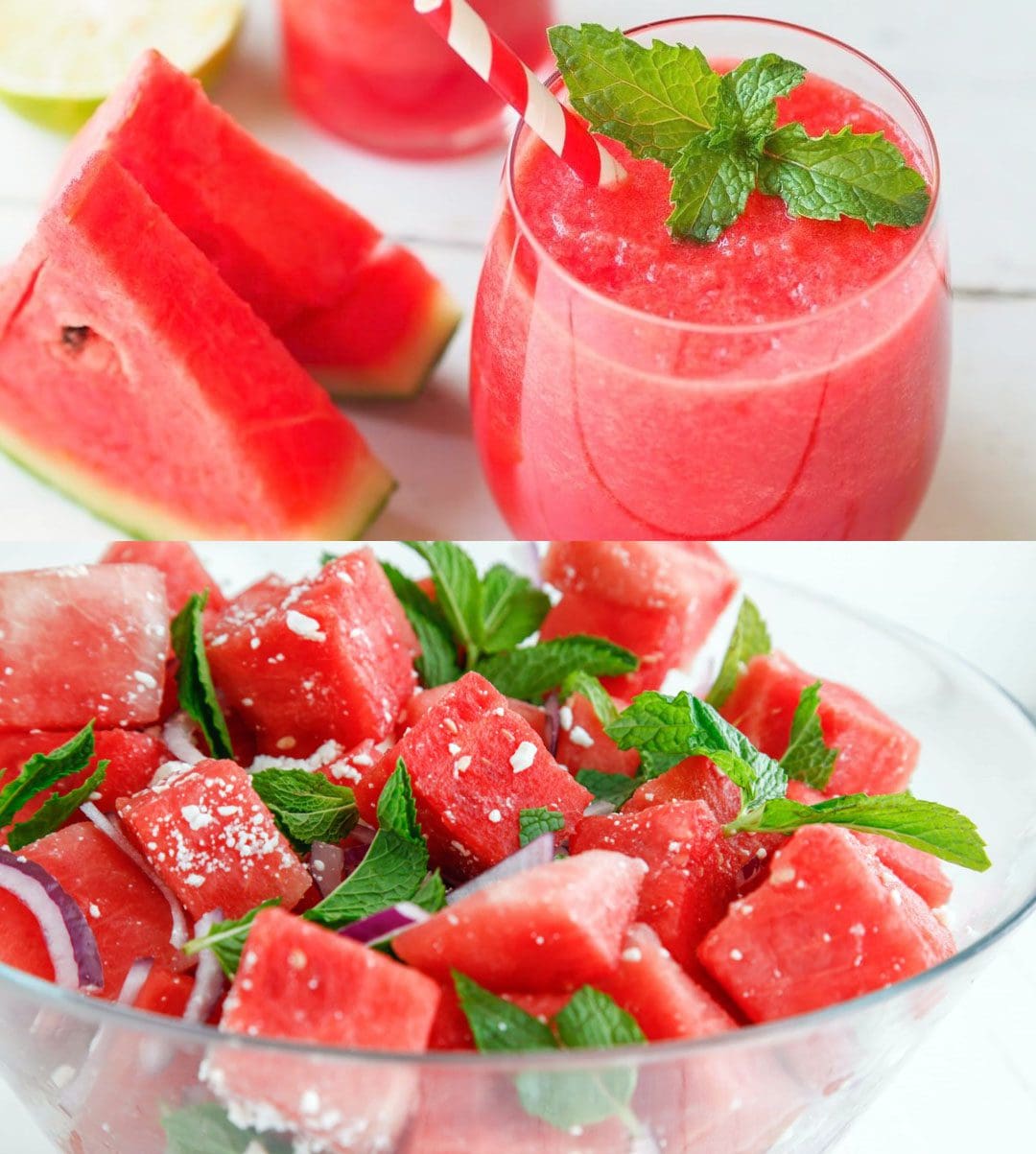Watermelon Nutrition: EP Wellness and Functional Clinic
Watermelon, one of the summer’s main fruits, is low in calories and rich in water. It provides an excellent source of vitamins A and C and lycopene and is less acidic than citrus fruits and tomatoes. The whole fruit is edible. The watermelon can be used as frozen chunks for water or seltzer drinks, smoothies, salsas, and salads; the rind can be stir-fried, stewed, or pickled, and the subtle sweetness pairs well with cheese, nuts, and other protein sources.

Table of Contents
Watermelon
Watermelon poses few risks, with research deeming the fruit nontoxic. Side effects from eating too much watermelon can include abdominal discomfort, bloating, and gas.
The fruit does contain sugar, recommending individuals with diabetes should be careful to avoid sugar spikes.
Vitamins and Minerals
- A fully ripe red watermelon contains higher nutrients than a less ripe watermelon.
- A single serving is a healthy source of vitamins C and A, providing a significant percentage of the daily requirement.
- Vitamin C aids in wound healing and can help increase anti-aging properties and immune system function.
- Vitamin A is important for eye health.
Calories
- One cup of diced or balled watermelon contains about 46 calories.
- Wedges around one-sixteenth of the melon, or 286 g, contain approximately 86 calories.
Benefits
Watermelon can benefit health in several ways.
Fight Dehydration
- Watermelon is nearly 92% water, making it a hydrating food choice.
- If it is a struggle to drink water, specifically during the hot summer days, a few servings of watermelon can rehydrate the body.
Reduce Blood Pressure
- Watermelon contains antioxidants that research has shown can help reduce or prevent high blood pressure.
- A fully ripe melon contains more lycopene than a tomato.
Reduce Risk of Infections and Cancer
- Other antioxidants include flavonoids, carotenoids, and triterpenoids.
- These antioxidants can help cell repair and lower the risk of infections and certain cancers.
Contributes to Weight Loss
- A group of overweight adults participated in a study that found the group that ate watermelon instead of low-fat cookies felt fuller.
- The watermelon group also showed reductions in body weight, body mass index, waist-to-hip ratio, and blood pressure.
Reduce Muscle Fatigue
- The fruit contains a significant amount of the amino acid citrulline.
- Capsules of concentrated citrulline are sold as nutritional supplements.
- The benefits are not conclusive, but some studies show that supplements could reduce the feeling of fatigue.
Nutrition Fundamentals
References
Bailey, Stephen J et al. “Two weeks of watermelon juice supplementation improves nitric oxide bioavailability but not endurance exercise performance in humans.” Nitric oxide: biology and chemistry vol. 59 (2016): 10-20. doi:10.1016/j.niox.2016.06.008
Burton-Freeman, Britt, et al. “Watermelon and L-Citrulline in Cardio-Metabolic Health: Review of the Evidence 2000-2020.” Current atherosclerosis reports vol. 23,12 81. 11 Dec. 2021, doi:10.1007/s11883-021-00978-5
Figueroa, Arturo, et al. “Watermelon extract supplementation reduces ankle blood pressure and carotid augmentation index in obese adults with prehypertension or hypertension.” American Journal of Hypertension vol. 25,6 (2012): 640-3. doi:10.1038/ajh.2012.20
Glenn, J.M., Gray, M., Wethington, L.N. et al. Acute citrulline malate supplementation improves upper- and lower-body submaximal weightlifting exercise performance in resistance-trained females. Eur J Nutr 56, 775–784 (2017). doi.org/10.1007/s00394-015-1124-6
Martínez-Sánchez A., Ramos-Campo D. J., Fernández-Lobato B., Rubio-Arias J. A., Alacid F., & Aguayo E. (2017). Biochemical, physiological, and performance response of a functional watermelon juice enriched in L-citrulline during a half-marathon race. Food & Nutrition Research, 61. Retrieved from foodandnutritionresearch.net/index.php/fnr/article/view/1203
Naz, Ambreen, et al. “Watermelon lycopene and allied health claims.” EXCLI journal vol. 13 650-60. 3 Jun. 2014
Panche, A N et al. “Flavonoids: an overview.” Journal of nutritional science vol. 5 e47. 29 Dec. 2016, doi:10.1017/jns.2016.41
Volino-Souza, Mônica et al. “Current Evidence of Watermelon (Citrullus lanatus) Ingestion on Vascular Health: A Food Science and Technology Perspective.” Nutrients vol. 14,14 2913. 15 Jul. 2022, doi:10.3390/nu14142913
Post Disclaimer
Professional Scope of Practice *
The information herein on "Watermelon Nutrition: EP Wellness and Functional Clinic" is not intended to replace a one-on-one relationship with a qualified health care professional or licensed physician and is not medical advice. We encourage you to make healthcare decisions based on your research and partnership with a qualified healthcare professional.
Blog Information & Scope Discussions
Our information scope is limited to Chiropractic, musculoskeletal, physical medicines, wellness, contributing etiological viscerosomatic disturbances within clinical presentations, associated somatovisceral reflex clinical dynamics, subluxation complexes, sensitive health issues, and/or functional medicine articles, topics, and discussions.
We provide and present clinical collaboration with specialists from various disciplines. Each specialist is governed by their professional scope of practice and their jurisdiction of licensure. We use functional health & wellness protocols to treat and support care for the injuries or disorders of the musculoskeletal system.
Our videos, posts, topics, subjects, and insights cover clinical matters, issues, and topics that relate to and directly or indirectly support our clinical scope of practice.*
Our office has reasonably attempted to provide supportive citations and has identified the relevant research study or studies supporting our posts. We provide copies of supporting research studies available to regulatory boards and the public upon request.
We understand that we cover matters that require an additional explanation of how it may assist in a particular care plan or treatment protocol; therefore, to further discuss the subject matter above, please feel free to ask Dr. Alex Jimenez, DC, or contact us at 915-850-0900.
We are here to help you and your family.
Blessings
Dr. Alex Jimenez DC, MSACP, RN*, CCST, IFMCP*, CIFM*, ATN*
email: coach@elpasofunctionalmedicine.com
Licensed as a Doctor of Chiropractic (DC) in Texas & New Mexico*
Texas DC License # TX5807, New Mexico DC License # NM-DC2182
Licensed as a Registered Nurse (RN*) in Florida
Florida License RN License # RN9617241 (Control No. 3558029)
License Compact Status: Multi-State License: Authorized to Practice in 40 States*
Presently Matriculated: ICHS: MSN* FNP (Family Nurse Practitioner Program)
Dr. Alex Jimenez DC, MSACP, RN* CIFM*, IFMCP*, ATN*, CCST
My Digital Business Card


